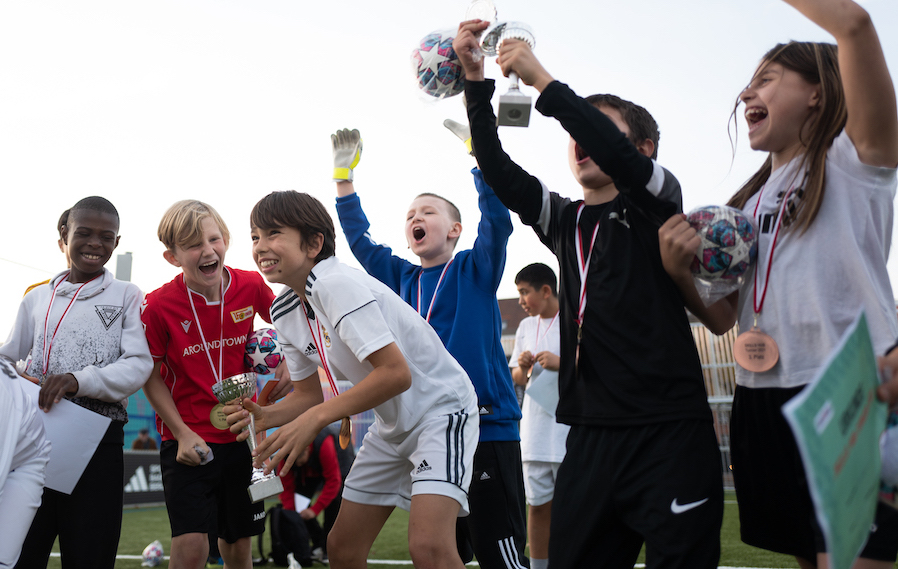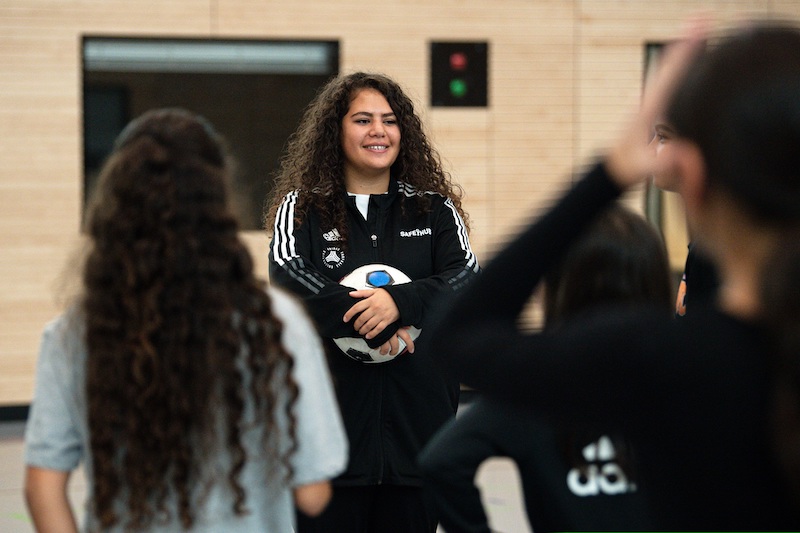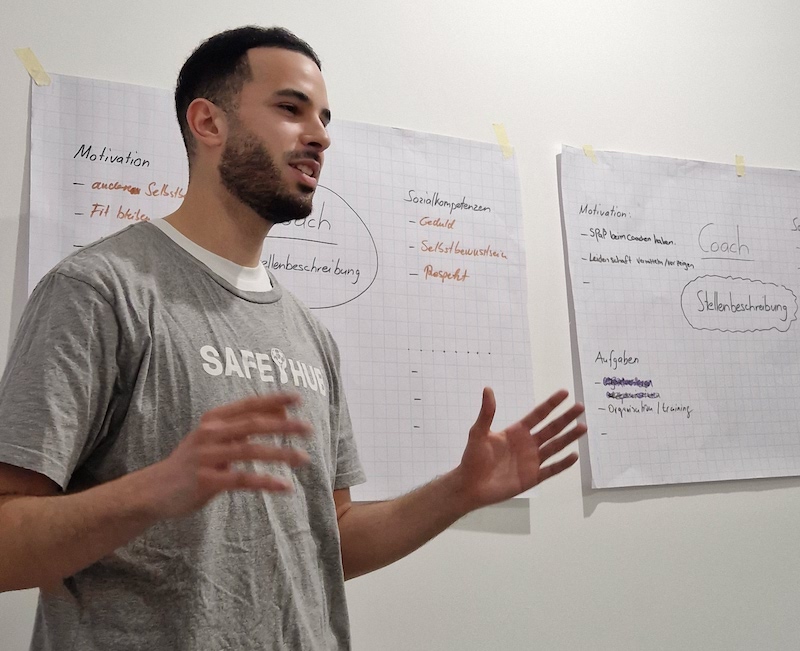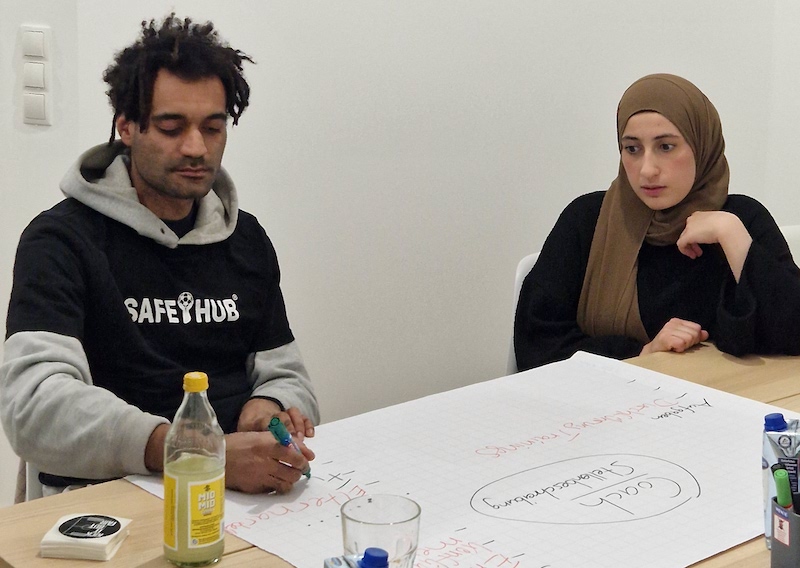
Safe-Hub Berlin: Creating Inclusive Spaces for Refugees & Immigrants Through Sport & Education
2022 Sport Together Fund Grantee Partner
April 6, 2023
In celebration of today’s International Day of Sport for Development and Peace (IDSDP), we are honored to introduce our inaugural Sport Together Fund delivered by Beyond Sport beneficiaries. With an initial focus on promoting “Leadership Together,” the seven recipients are providing sports-based leadership training opportunities for refugees, asylum seekers and vulnerable communities that promote well-being and inclusivity.

Safe-Hub Berlin is a program of international social enterprise, AMANDLA, which envisions a world where all young people have access to equal opportunities, strive to realize their full potential and dare to dream. The organization is using its Sport Together Fund (STF) grant to deliver a series of training workshops for youth sport coaches with refugee and immigrant backgrounds covering conflict and trauma-informed sport coaching. Once trained, the coaches will then support other young refugees in their community through its EduFootball program.
Operating 12 sites across four countries, the award-winning Safe-Hub youth development model provides physical and emotionally safe spaces where young people and the surrounding community can access quality after-school programs, strong role models and a range of services, opportunities and mentoring. Leveraging sport, learning and partnership, the program supports the emotional, physical, mental and personal growth of its young participants so that they are better able to face the demands and challenges of everyday life.
Safe-Hub’s free EduFootball program is the organization’s central curriculum which functions through a combination of team-based football training, competitive leagues, tournaments, life skills development, holistic education and academic mentorship. It also offers a targeted GIRLS HUB training program to empower girls and provide young women with better access to sport and movement activities. In 2022, around 200 EduFootball and GIRLS HUB sessions were conducted with 812 participants and 526 professional football coaches receiving capacity building on the integration of social competencies into their training sessions.

Refugees in Germany
Germany is the largest host country for refugees in Europe. Through March 2023, the German Federal Office for Migration and Refugees recorded around 58,802 asylum applications. In 2022, there were 244,132 thousand applications, representing an increase of over 50,000 as compared to the prior year. While the majority are from Syria, asylum seekers mainly come from Afghanistan, Turkey and Iraq. However, more than 1 million Ukrainian refugees came to Germany last year.
Safe-Hub Berlin operates out of Berlin-Wedding, one of the city’s most disadvantaged neighborhoods, where many youth have been ‘forgotten’ by local governments and structures. Statistics show that 68% of children there are at risk of poverty and 85% of the community are from non-German and immigrant backgrounds. The organization works with populations from Syria, Ukraine, Iraq, Iran, Morocco and Turkey, among other countries, and is using its STF grant to train 18–30-year-old coaches who have refugee and/or immigrant experiences.

“Most of our coaches have roots somewhere else other than Germany. Some have been in Germany for 40 years and others have just arrived. They can relate to refuge and what it’s like to seek this and why. This word refuge speaks to how Berlin and the specific community we work with has been formed,” shared Head of Education Programs, Maria Requena Lopez.
Through sport, Safe-Hub Berlin wants to empower and build the experience level of its young coaches so that they can understand how to work with people coming from differing cultural backgrounds and are living with different types of traumas. This will allow them to better be able to mentor and help refugees and migrants work through conflict situations.
Through football exercises, which are open to all, the organization raises awareness on topics such as communication (how do I talk to my teammates?), unconscious bias (how do I take the decisions in the activities? Who do I pass to? Who do I take in my team?), diversity and inclusion, fair play and mutual respect. The organization understands that the desire to move and play brings children and youth together and keeps them engaged. Through sport, they are able to enjoy themselves while also learning valuable skills that come from having to reflect on the dynamics that take place on and off the pitch.

The workshop series, which began in early March and runs through the end of April, specifically focuses on how to effectively link football with development and how to work with children facing trauma and conflict. Subjects include sports and gender equality, first aid, intercultural child protection, addressing emotion through movement and child psychomotor (links motor skills with psychological and emotional factors) training.
One of the young coaches, who has taken part in the “Dealing with conflicts” and “Gender equality in sport and social activities” workshops, said: “We have had the chance to share our experience as coaches and get important insights about fundamental questions of our work. I have felt listened to and reassured, and I feel more confident to work with children from minority communities and to be more intentional about topics like inclusion and equality.”
Beyond Sport launched the Sport Together Fund in 2022 to provide grants and capacity-building support to non-profit organizations, sports clubs and collectives who are assisting communities facing conflict, displacement, human rights violations and climate change disasters through sport. The Fund also supports the transit and host communities where people are rebuilding their lives.
Learn more about all our Sport Together Fund Grantee Partners HERE.
Yoga and Sport with Refugees: Helping Refugee Coaches Support Their Communities
2022 Sport Together Fund Grantee Partner